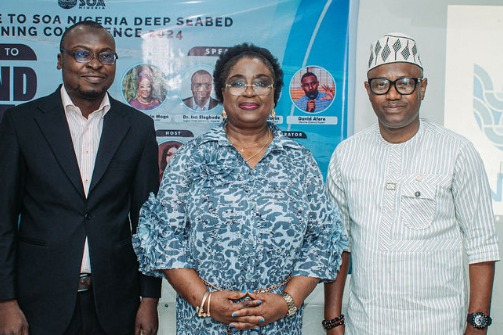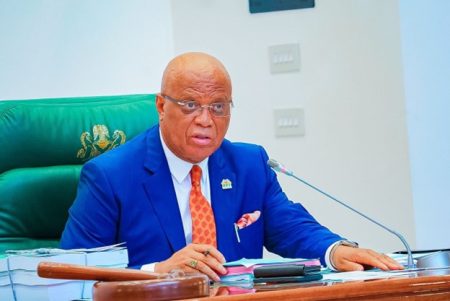
Esther Oritse
Lagos — Stakeholders and environmentalists in Nigeria have warned against the negative impact of Deep Seabed Mining, DSBM, if urgent measures were not taken to stop the unwholesome exploitation of the seabed in a sustainable manner.
Speaking at a two-day training hosted by Sustainable Ocean Alliance, SOA, a Non-Governmental Organization, NGO, former Director of the Marine Environment Management department of the Nigerian Maritime Administration and Safety Agency, NIMASA, Dr. Felicia Mogo said that inadequate environmental regulations will be needed for specific and enforceable standards so as to save the seabed from total destruction.
Mogo who is also the Founder and President, African Marine Environment Sustainability Initiative AFMESI, said that Nigeria needs a strong grasp of its theoretical, geographical, biophysical, and historical current state of its area of interest in the sea, with a view to providing good governance and regulatory framework for deep seabed mining.
She said: “However, to achieve our goal, we need a strong grasp of its theoretical, geographical, biophysical, and historical current state, its governance and regulatory climate policies, look at opportunities as well as challenges in its attainment and existing informative case studies globally that may serve as comparators. All this information will help us to identify actionable ways of moving forward.
“Marine environment and ecosystems are invaluable to the health and sustainability of our planet. These diverse environments, including Rivers, Seas, and Oceans, and ecosystems, including coral reefs, mangroves, and deep-sea habitats, offer critical services such as supporting biodiversity, regulating climate, and sustaining economies through fisheries, tourism, mineral exploration and extraction, and coastal protection.
“Technology is revolutionizing deep seabed exploration, significantly enhancing our ability to manage coastal zones and protect the environment Inadequate Environmental Regulations.
“The moratorium on mining must be sustained as the growing support for halting deep seabed mining until robust regulations and scientific evidence are in place.
“Nigeria must develop national policies that align with international standards just as it must also build capacity in marine geology training, environmental impact assessment and maritime law.
“Emphasis must also be on research and exploration, mapping resources and understanding environmental impacts. Nigeria’s Current Position in Deep Seabed Mining lack of infrastructure and technology.
“Nigeria will require significant Infrastructural improvements including ports and processing facilities. This will demand large scale investments and efficient planning.
“Nigeria as a member of the comity of Nations is contemplating the diversification of our economy through Blue Economic Development. Part of the Blue Economy initiatives is deep seabed mining because of its potential to provide essential materials for renewable technologies enhancing recycling efforts and diversifying supply chains.”
For Dr. Isa Elegbede, an Environmentalist and lecturer at the Lagos State University said that Deep-sea mining could severely harm marine biodiversity and ecosystems if it is carried out in unsustainable manner.
Elegbede explained that Rising demand for minerals, metals, recent technological advancement, scarcity of resources from conventional mining Population growth and increase in consumption has brought an increase in the mining of the seabed.
Also commenting, the Chair of Sustainable Ocean Alliance in Nigeria and Convener of the conference, Adenike Adeiga stated that, the ocean is threatened by various human activities and precaution must be taken to guard against further negative impact on the seabed.
Adeiga also said that the importance of the marine environment cannot be overemphasized, from how it supports our livelihoods as humans to providing food security and most importantly its role in regulating the climate.
She said: “Today as you may know that the Nations of the world are about to make a decision that will either secure or threaten our future.
“Now, we are gathered not just to discuss the challenges but to take decisive action on behalf of the deep seabed. Asides from the over 10,000 species discovered in the deep sea, there is a new discovery that the polymetallic nodules found on the seabed can produce oxygen. It is such a fragile ecosystem.
“Our goal is that this conference will foster collaboration, sharing of innovative solutions on how we can take actions individually, at your organizations and encourage our government to join the call for a precautionary pause on DSBM.
“Each of us has a role to play in safeguarding our common heritage, the ocean and the deep seabed for now and the future generations.
“Your dedication to the safeguarding the planet is not taken for granted and let us make this conference a catalyst for positive change and a brighter future for our oceans.


